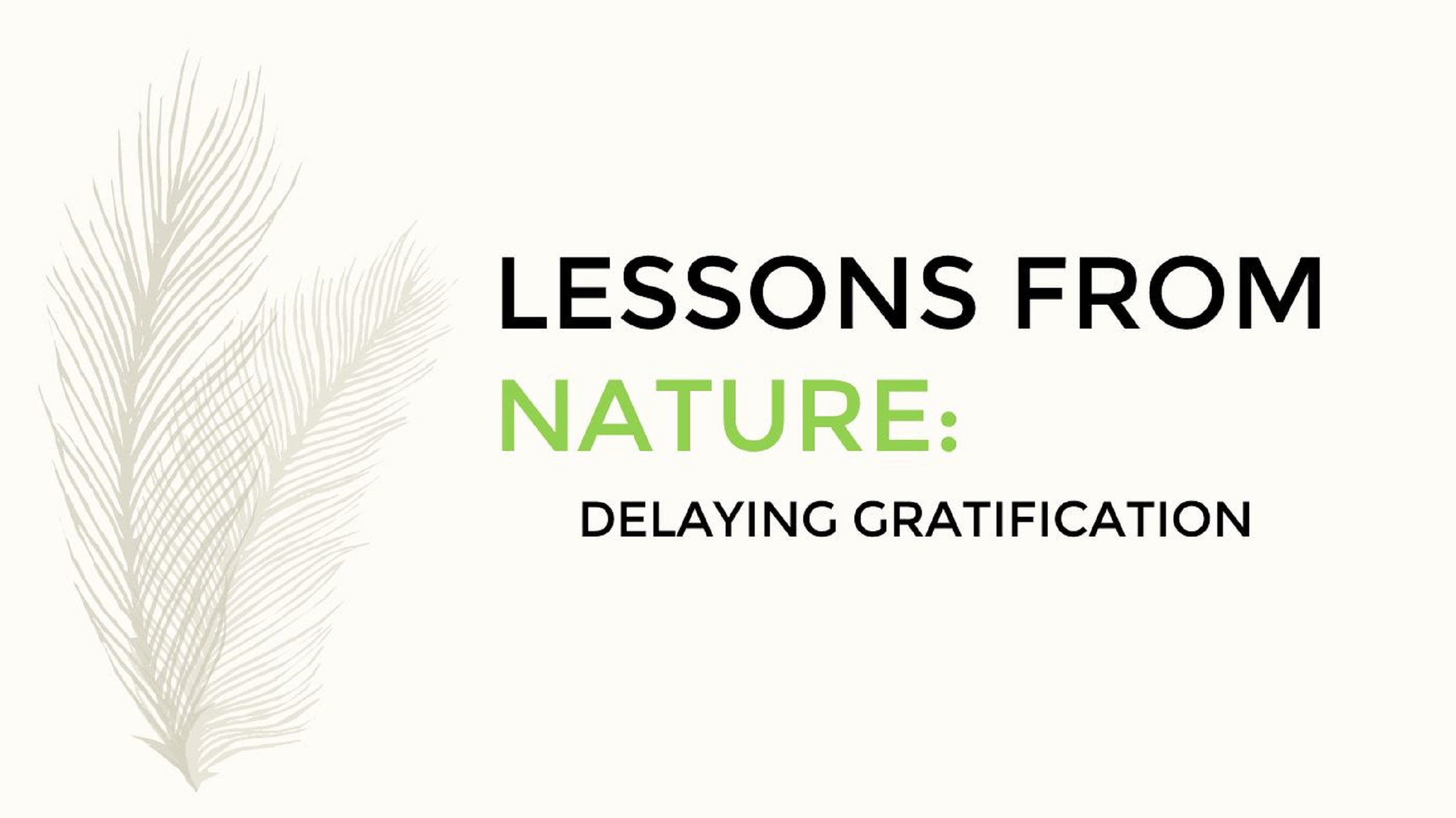Lessons From Nature: Delaying Gratification
There is a need for founders to delay gratification when it comes to their new enterprises. This article takes an in-depth look at lessons from nature backed up with live case studies to see how delaying gratification can affect the success of startups.
Related: Lessons from Nature: Waiting for Maximum Productivity
What is gratification?
Gratification is the need to received what is desired. Dictionary.com defines it as the state of being gratified; great satisfaction. But what does it mean to gratify? To gratify means to reward; remunerate.
One can regard gratification as that reward for the hard work of a person. In this particular case, the hard work of the founder(s) in the form of temporal (time), intellectual, financial, physical, or any other type of capital invested in the business. This reward can be well deserved and can be derived in a variety of ways. One of such methods is “indulging” in some gifts by taking out a part of earned profits.

What does it mean to delay gratification?
Delay is a word in everyday use, and it means to put off to a later time or to postpone or defer. Therefore, to delay gratification means to put off getting a reward till the business can adequately afford it.
But you might ask, why will it be necessary to defer remuneration? After all, the labourer is deserving of his wage, and you are entitled to getting something for your hard work. Even if not for anything, to keep your spirit up and continue to grind for success. We’ll get to that in a bit but first, let’s examine nature’s perspective.
Delaying Gratification in Nature
This lesson will be examining the life of plants and see how gratification applies.
In plants, there is a natural process that runs from germination to maturity (and fruiting), and the plants perform best when this cycle is allowed to take its due course. In nature, fruits are a way for plants to multiply, a concept for consideration in later lessons. But to the farmer or whoever cultivates a plant, the fruit is the reward.
Plants are classified as photoautotrophs which means they capture energy from the sun and use CO2 as their source of carbon. Therefore, they are the primary producers of organic energy.
Humans, on the other hand, cannot use energy from the sun and CO2 to sustain their processes. This makes humans rely on plants for energy. Humans primarily cultivate plants for consumption, and fruit trees are not an exception.
Farmers who grow fruits or any plant know that there is usually a time of investment; in the form of land preparation, planting, weeding, among others. The investment made ensures that the plant has the optimal conditions for bearing fruit.
Fruit trees
Fruit trees are usually perennial.
Perennial means that their lifespan is greater than two years by classification. But in reality, most trees continue to live and produce for decades.
Some other plants such as legumes are classified as annual crops, grow, fruit, and die within a year. Without bothering you with the details of agriculture, perennials may take up to three or more years before they begin to fruit.
More about the lifespan/productivity and time of fruiting will also be considered in another lesson.
For this lesson, someone who cultivates fruit trees has to continuously invest in the tree year after year before any fruit shows up. Furthermore, suppose the cultivator decides to maximize the productivity of the tree. In that case, it might be needed to sacrifice (not harvest) some of the first fruits.
The reason perennials take a long time to fruit is because they need to grow, and adequately develop before fruiting. But once they begin to fruit, they do so year in year out for the rest of their life. Anyone who cultivates these trees understands the need to wait and does so patiently knowing that it would eventually pay off. Abandoning the tree midway will result in a lost effort; therefore, he/she perseveres until it is time to harvest.
But how does all this talk relate to startups?
Founders, Startups, and Gratification
Human ego may tempt founders at the beginning of their entrepreneurial journey to ¨reap the fruits of their labor¨. This ¨fruits ¨ are usually in the form of profits made from business conducted at the early stages.
If a founder tows this line, it is deriving instant gratification. It can be very disadvantageous to the startup. Removal of these profits can lead to stagnation and the eventual death of the startup.
Delaying Gratification in Startups
Startups need to grow before they become self-sustaining until the business reaches this self-sufficient stage; it can’t start catering for the wants of the founder. Just like the trees need time to grow and develop before fruiting, the business needs to grow. Therefore the need to delay gratification.
A founder needs to understand the need to let the business grow before pulling out funds. As can be seen in nature, trying to reap fruits too quickly can result in the hampering of the potential of the plant, never reaching its full capacity.
…
Real examples of how gratification can affect a startup are in details below.
CASE STUDIES
According to CB Insights, running out of funds is responsible for 29% of startup failures. In their classification, not being able to secure funding was different; therefore, it can be inferred that these companies did have funds they were operating with.
An example of such a company is Daqri – an augmented reality startup that burnt through $250 million of funding. This serves to drive the importance of financing in sustaining a startup.
Now to the case studies – the companies who mismanaged company funds for selfish gains and as a result, ran the company to the ground. We will be examining two companies a well-established company brought down by greed – Kmart and a startup that had a greedy founder – WeWork.
Kmart
The roots of this company can be traced to as far back as 1899. It has since thrived achieving giant status and making billions of dollars in revenue. But how does a well-established company like this that has practically existed for more than a century collapse?

On January 22, 2002, Kmart filed for bankruptcy under the leadership of Chairman Charles Conaway and President Mark Schwartz. They were accused of misleading shareholders and other company officials about the company’s financial crisis.
They also allegedly spent the company’s money on aeroplanes, houses, boats and other luxuries. At a conference for Kmart employees on January 22, Conaway accepted “full blame” for the financial disaster.
The company later emerged from bankruptcy and merged with Sears. Sixteen years later, Sears, the parent company, also filed for bankruptcy. In February 2019, 202 Kmart stores were sold to Transform Holdco LLC. The sale only saw more decline for Kmart.
On August 29, 2019, the massive closure of 77 Kmart stores was announced, with the stores being closed by December 15, 2019. In November 2019, Kmart announced the closing of 45 stores in February 2020, which included the last Kmart in many states of the US.
On February 6, 2020, Kmart announced it would close 15 more stores on June 30, 2020, due to the city buying the property.
Suffice it to say that Kmart was not the same again after what happened in 2002.
WeWork
For many employees, WeWork’s proposition was as intoxicating as it was vague. “I bought into it,” a designer said, of the company’s vision—”this new’ office of the future.’
WeWork was founded in 2010 and expanded to 836 locations and had 150000 employees.
Softbank invested $3.1b in WeWork and leading new rounds funding pushing the valuation up till $47b
WeWork had positioned itself as a tech company using words such as physical, social network and artificial intelligence to pave an easier path to seeking capital.
Tech businesses differ in valuation compared to Traditional companies because of their ability to scale rapidly.
It was the perfect story of a startup, and by May 2019, they filed for an IPO to begin trading in the stock market.
A Prerequisite for IPO’s is the release of company’s financials called S-1 filings.
By the time people got a chance to look at their books, they had bailed on investing in the startup.
In 2018 the company generated $1.8 b and spent $3.7b. It needed money from the IPO to continue operating
Adam Newmann
The actions of the CEO did not help the company either, Newmann borrowed money against his stock and used it to purchase properties which he then leased to the company. He also registered the name WE under his name and then sold it to the company for $6m.
He borrowed $740m against his stock and sold a large number of his stock and acquired a private jet.
Adam New had lost credibility and was ousted with two new CEOs brought in and the company and to seek profitability as a real estate company that they are.
Final words.
Delaying gratification can be something hard, especially when the founder does not have another source of income, but it is essential.
The only downside to delaying gratification is that you might not be able to enjoy the “liberties” that would have been otherwise possible. But this is what differentiates entrepreneurs.
Someone once said, “Entrepreneurship is living a few years of your life like most people won’t so that you can spend the rest of your life like most people can’t.”
It gives the new company a fighting chance as it takes an “unnecessary” burden off of its shoulders. Therefore if you a passionate about building a lasting business, delay gratification!
It is also essential to keep yourself motivated to keep your drive alive. Delaying gratification is a call to persevere. Perseverance helps you push through the times when things will not be ideal. There are several ways you can keep yourself motivated, and some of them include:
- Taking stock –
- Keeping records helps track growth, one can see how far one has come, and this in itself can be satisfying.
- Another way is to continually remind yourself of the reason you chose to be an entrepreneur, a potent way of renewing your drive.








2 Comments